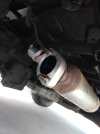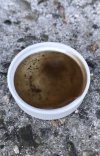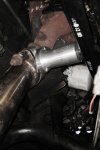Finally got a compression tester adapted to the exhaust manifold (replaced EGT probe/plate)... I need to make sure the exhaust brake doesn't generate excessive back pressure resulting in hanging valves.
Well, in the driveway I was unable to measure any back pressure; my gauge only has increments every 10psi, but I wasn't even seeing a notable flutter. I decided to give it a test run anyway. So at 55mph coasting downhill I shut the exhaust valve and the exhaust note changed as expected, but I felt nothing of significance... no engine/exhaust braking. I pull over to check the gauge and it's not showing anything either.
The lockup clutch should have been engaged in 4th above ~40mph; I think. If not, this isn't going to be of any real benefit on an automatic... exhaust braking only being effective at very high speeds isn't of that much use; especially if the transmission has to be being driven by the engine for lockup (?).
Next step I'm going to move the brake valve up to the turbo downpipe. It's more hassle, but oh-well. I'm figuring maybe eliminating the entire 2.5" exhaust will cause it to generate more back pressure (less space to compress). I'm a bit disappointed that the results were so poor/inconclusive...
If anyone has any other ideas/suggestions, I'd love to hear them.

Well, in the driveway I was unable to measure any back pressure; my gauge only has increments every 10psi, but I wasn't even seeing a notable flutter. I decided to give it a test run anyway. So at 55mph coasting downhill I shut the exhaust valve and the exhaust note changed as expected, but I felt nothing of significance... no engine/exhaust braking. I pull over to check the gauge and it's not showing anything either.
The lockup clutch should have been engaged in 4th above ~40mph; I think. If not, this isn't going to be of any real benefit on an automatic... exhaust braking only being effective at very high speeds isn't of that much use; especially if the transmission has to be being driven by the engine for lockup (?).
Next step I'm going to move the brake valve up to the turbo downpipe. It's more hassle, but oh-well. I'm figuring maybe eliminating the entire 2.5" exhaust will cause it to generate more back pressure (less space to compress). I'm a bit disappointed that the results were so poor/inconclusive...
If anyone has any other ideas/suggestions, I'd love to hear them.



